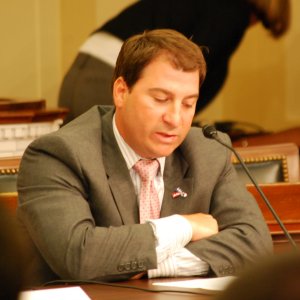Pala CEO Jim Ryan Talks New Internet Gambling Codes, California Bills

 On Friday, PocketFives had the opportunity to sit down with Pala Interactive CEO Jim Ryan (pictured), who formerly held the same position at Excapsa and bwin.party. Ryan’s newest venture has made inroads into the regulated New Jersey gaming market via an online casino and comes with a unique perspective on the future of our industry.
On Friday, PocketFives had the opportunity to sit down with Pala Interactive CEO Jim Ryan (pictured), who formerly held the same position at Excapsa and bwin.party. Ryan’s newest venture has made inroads into the regulated New Jersey gaming market via an online casino and comes with a unique perspective on the future of our industry.
PocketFives: Thank you for joining us. Talk about your expectations for the new i-gaming credit card code, which would in theory make it easier for customers to deposit onto regulated sites.
Jim Ryan: I am excited about it. The new merchant category codes are coming out on April 17. What’s unique is that the credit card companies have come out with three new codes: one for online lotteries, one for licensed online casino operators, and one for Advanced Deposit Wagering. The problem we have today is that banks aren’t coding transactions because they can’t differentiate between regulated and non-regulated operators. With these new merchant category codes coming out, they can differentiate them. That’s cause to be excited.
The key to this is that it’ll only work if Visa and MasterCard educate financial institutions. They have to understand why it exists and what it does. On April 17, this won’t be a silver bullet for the sector. I think it’ll represent a 20% to 30% improvement in depositing, though. For every $1 we successfully deposit right now, we have $2 rejected. Literally, we have a 33% success rate. I appreciate that consumers are trying over and over to deposit, but anything a merchant can do to improve that rate and that process will be good.
PocketFives: What do you see as the future of payments in regulated markets?
Jim Ryan: In the absence of the new merchant category codes, in existing or any future regulated markets, we need a traditional e-wallet. Neteller now isn’t the Neteller of the pre-UIGEA days. It has a lot of the same features, but PayPal is the holy grail of e-wallets. I believe PayPal is coming and will be very good for the marketplace.
There has also been an evolution of a few creative solutions like PayNearMe, a prepaid card you can pick up at 7-11. It has been very successful in New Jersey. Mazuma is a bank-to-bank transfer solution, but you don’t have to give merchants your bank account information directly. You’ll see the evolution of more of the prepaid and bank-to-bank solutions.
 PocketFives: What is your outlook on regulated i-gaming in California?
PocketFives: What is your outlook on regulated i-gaming in California?
Jim Ryan: Boy did we come close last year. We had a unified bill drafted. We had 13 of California’s most significant tribes ready to do it, but we ran out of time. We needed to nail down the racetrack issue. I started this legislative session being optimistic, although I would give it low odds of a bill passing in 2015, but that’s subject to change.
The stakeholders in California need to reconcile their positions. A lot of people want this to happen. Some of the key issues are whether racetracks should be included and what you should do with tainted assets. All of the stakeholders need to get on this before the Federal Government addresses the Wire Act. We are very mindful of a Republican-controlled Congress amending the Wire Act and effectively eliminating the prospects of regulated online poker in California for the foreseeable future.
Jim Ryan: It’s a most interesting time in that we have a Republican-controlled Congress and a well-financed political effort to amend the Wire Act. This is the most significant threat we’ve had post-Black Friday. There has been nothing but positive momentum recently. We have seen Federal efforts that looked like they had good chances, we had three states embrace it, and we had states like Pennsylvania, California, Illinois, Washington, Mississippi, and Ohio looking into it.
There are 10 or 11 states that have considered some form of online gaming legislation. Now, we have a well-financed effort in a Republican-controlled Congress. I think Adelson’s legislation has a good shot of passing.
If they are successful in amending the Wire Act, the very things they seek to prevent, they’ll provide a catalyst to happen. They’re worried about underage gambling and terrorism. Why push it into the black market as opposed to regulating it? I would love to get involved in the debate when that point is discussed.
The poker community has done a great job of saying this is wrong. This doesn’t make sense. For example, I spent six years in Europe and that market has slowly embraced regulated gaming and anarchy hasn’t broken out. We know who’s funding every account and where the money is going to and coming from.
 PocketFives: Earlier this week, PPA Executive Director John Pappas disputed the notion that terrorists are using internet gambling sites to funnel money, saying that isn’t happening. Do you agree with Pappas (pictured)?
PocketFives: Earlier this week, PPA Executive Director John Pappas disputed the notion that terrorists are using internet gambling sites to funnel money, saying that isn’t happening. Do you agree with Pappas (pictured)?
Jim Ryan: I would agree. I’ve never seen any credible evidence. We’ve seen some bad actors, but the solution is to regulate the market. The US is still a multi-billion dollar unregulated online gaming market. Adelson has a fundamental concern that underage players are playing, but New Jersey hasn’t had a reported case of underage gambling in its first year. You can’t get significant dollars in and out of the system like a terrorist would need to do. In a regulated environment, all of these abnormalities would be vetted out.
PocketFives: How did you end up with Pala Interactive?
Jim Pala: The announcement came out a couple years ago. I got a call from Pala inviting me to their resort to look at their online gaming strategy. I had just left bwin.party and was in Toronto during what was probably the coldest winter I can remember and took a trip to California and sat down with Pala’s management. They walked me through their strategies and it was impressive.
I became CEO in 2013 and we started off with New Jersey. We are trying to take a realistic approach there. It’s all about getting your business live and fine-tuning it. You can’t do that without operating for real. We’re building a very decent online gaming business and we won’t be active in every state that opens up. Nevada is an interesting state, for example, but it’s poker-only and its liquidity base isn’t big enough, so we won’t go there. Pennsylvania, Illinois, and California – those are our near-term prospects.
PocketFives: In the past, you’ve headed up Excapsa and bwin.party. What made Pala alluring?
Jim Ryan: bwin.party had 4,200 employees. Excapsa had about 220 employees. Pala has 40 staff members today. What I found intoxicating was that it was an opportunity to build our own product, make our own statement, and have our own platform. The ability to re-architect the platform and have it operate on a modern, more efficient technical base is important. I’m thoroughly enjoying it and focusing on the US regulated market. We don’t have to worry about whether a country is going to make our business illegal; we’re staying out of any grey areas.
Want the latest poker headlines and interviews? Follow PocketFives on Twitterand Like PocketFives on Facebook. You can also subscribe to our RSS feed.

 PocketFives: Speaking of the Wire Act, talk about
PocketFives: Speaking of the Wire Act, talk about  They were developing their own back-office platform and believed a successful operator had to control their own software. They were also well-capitalized. All of that was compelling and I asked why they were just focusing on California. I said they should focus on the entire US market and they agreed.
They were developing their own back-office platform and believed a successful operator had to control their own software. They were also well-capitalized. All of that was compelling and I asked why they were just focusing on California. I said they should focus on the entire US market and they agreed.


